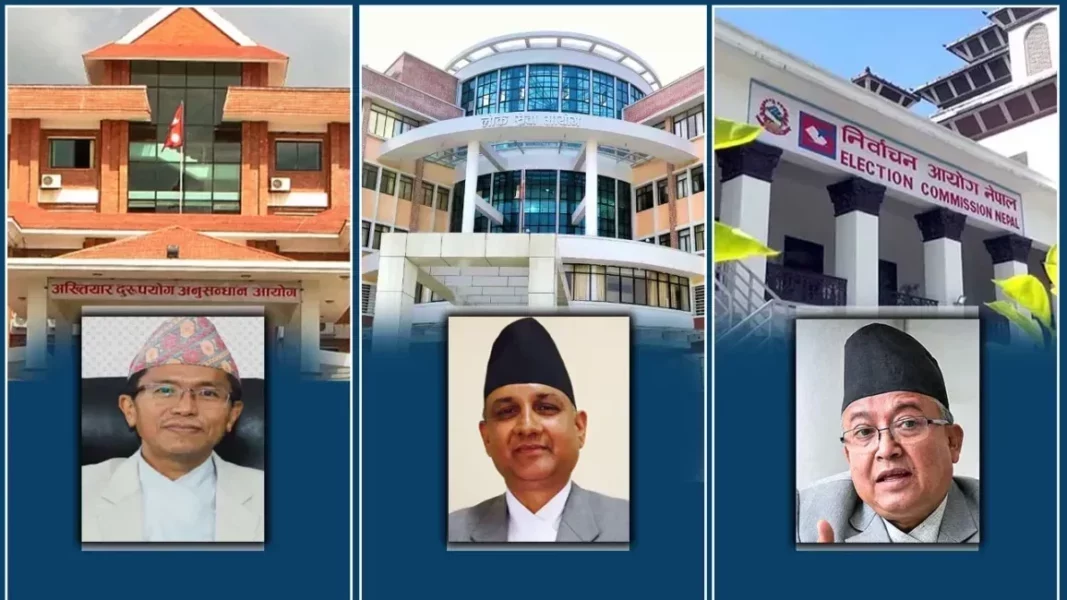KATHMANDU: The troubling dearth of good governance is becoming increasingly evident in Nepal, where constitutional bodies find themselves divided along political lines and populated by retired personnel.
A closer look at cases presented before the Commission for the Investigation of Abuse of Authority (CIAA) and the revelations within the Auditor General’s Office report underscore a growing prevalence of financial irregularities within government agencies.
Appointments based on political affiliations within constitutional bodies, intended to uphold government accountability, transparency, and fairness, paradoxically hinder their ability to scrutinize governmental actions.
The need for institutionalized control and balance in the state’s operation is paramount, with constitutional bodies tasked with guiding, facilitating, and monitoring executive actions.
Regrettably, these bodies, mandated to be accountable to the constitution and parliament, appear to be more responsive to political parties and the government.
Constitutional bodies play a crucial role in safeguarding civil rights by curbing governmental power and checking executive arbitrariness, fostering good governance and the rule of law, according to Dr. Bimal Koirala, former Chief Secretary.
It is said that “at least fifty percent of the members shall be appointed members of the public service from among those who have been in government service for a period of twenty years or more”.
Dr. Koirala contends that the prevalence of ex-employees in constitutional appointments has undermined the essential ‘checks and balances’ required for effective governance.
He emphasizes that the Constitutional Council should recommend individuals with expertise and competence, rather than favoring those in proximity to power.
In Nepal, however, appointments to the Constitutional Council appear to be driven more by personal connections than merit, creating concerns about the ability of these bodies to fulfill their intended roles.
Determining the number of constitutional bodies in any country is a complex task, influenced by factors such as the prevailing environment, specific needs, justifications, available resources, and the outcomes they yield.
When establishing these bodies, it is crucial to prioritize values like clarity in roles, duties, and rights, the assurance of impartiality, independence, and autonomy, accountability to the public, professional immunity, and the provision of adequate resources and manpower.
Moreover, meticulous attention must be paid to preventing any overlap in the scope of work among these bodies.
In this process, consideration of the financial burden on the state treasury and the avoidance of jurisdictional duplication are essential.
However, senior advocate Ram Krishna Kafle points out that these considerations are not given due priority by the government in Nepal.
Former Chief Secretary Koirala contends that, particularly in a country like Nepal where political culture and civilization are still evolving, such constitutional structures play a crucial role in shaping society.
However, he expresses concern that the government has failed to uphold the dignity of these structures.
The system’s integrity is compromised by a practice of favoritism, notes advocate Kafle.
Many government agencies responsible for supporting the state apparatus have a tendency to appoint individuals aligned with the ruling party, thereby weakening the foundations of good governance in the country.
Kafle emphasizes that the transformation of constitutional bodies into recruitment centers based on political proximity has cast a shadow over the principles of good governance.
He highlights the ongoing struggle among political parties to control appointments to these bodies, stating that such appointments provide leaders with a lever to influence favorable decisions during challenging situations, thereby compromising the integrity of these institutions.
According to him, it is not natural for the employees to spend their energetic time in government service, and then increase their passion for this service.
Instead of proving themselves by getting the opportunity to serve the same nature again and again, they spend a lot of time making the character who created the opportunity happy.
Kafle says that the result of this is proven by the results of the work of such agencies.
Former Chief Secretary Koirala also seems to agree that due to the lack of opportunities for subject matter experts in the constitutional bodies, the results have not been favourable.
He says, “In order to keep the constitutional body alive, there should be a change in the existing recommendations.”
These bodies, he argues, can maintain their dignity only by appointing retired employees on the basis of need in constitutional appointments and other appointments on the basis of open competition or expertise.
Advocate Kafle also says that based on the nature of the constitutional body, opportunities should be given to qualified and capable people.
He says, “If government employees are tested, we cannot expect results from them.”
Opportunity should be given to energetic persons in the appointment of state management bodies.
For that, open competition or the creative, research and productive work done by him in various fields can also be considered as a basis.
Veto in the law to create opportunities!
Government employees have a hand in law making from the beginning.
There are many examples in Nepal where drafts of laws drafted by employees are tampered with by the government, political parties and MPs representing the parliament.
According to a member of the Constituent Assembly, many subjects were included in the constitution without their knowledge during the constitution making process.
He argued that every law and rule created in Nepal is dominated by the interests of external parties.
Upon former Secretary Umesh Mainali’s retirement, the chairmanship of the Public Service Commission transitioned to former administrator Madhav Prasad Regmi. Commissioners of the Election Commission similarly comprise former government employees, with figures like Bishnu Pratap Shah, Keshav Raj Rajbhandari, Bhojraj Pokharel, and Dinesh Thapalia following the same trajectory.
It is his experience that even employees who play a role in the creation of laws from the beginning to the end put favorable issues in the law to secure their position.
Article 242 of the Constitution has provision regarding Public Service Commission. In sub-section (1) of that article, there is provision for the chairman and members who are in the public service, while in sub-section (3) the subject of appointment and qualification is kept.
It is said that “at least fifty percent of the members shall be appointed members of the public service from among those who have been in government service for a period of twenty years or more”.
They will be appointed from among the people who have achieved fame through research, research, teaching or any other important work in other fields of national life.
Not only in the public service, another powerful constitutional body, the CIAA also has a strange picture.
Let’s look at the provision made in sub-section (6) of Article 238 of the Constitution regarding the qualification for appointment to the position of chief commissioner or commissioner of the CIAA:
(a) Graduated from a recognized university,
(b) Not affiliated with any political party at the time of appointment,
(c) Possessing a minimum of twenty years of experience and a reputable track record in the fields of accounting, revenue, engineering, law, development, or research;
(d) Attaining the age of forty-five years, and
(e) Demonstrating high moral character.
The CIAA stands as the most potent entity among constitutional bodies, playing a pivotal role in fostering good governance within the country.
For this to occur, the government must ensure a conducive environment marked by fairness.
Unfortunately, this ideal scenario is yet to be realized in Nepal.
Even in locations like CIAA, remnants of the former bureaucracy persist.
Political parties tend to favor specific individuals, with the majority of chief commissioners being former government employees.
The current Chief Commissioner, Prem Kumar Rai, is a retired Home Secretary.
Attorney Kafle highlights that a shortage of staff within the authority poses a significant obstacle to the establishment of good governance.
Even after being relieved of their official duties, individuals like the late Chief Secretary Sankardas Bairagi continue to contribute to government services in roles such as Security Adviser.
Moreover, individuals in positions to advocate for good governance often enjoy dual benefits, leading Kafle to assert that expecting effective governance from those who do not reject government dual benefits is futile.
Former government employees occupy various roles across the government sector.
Upon former Secretary Umesh Mainali’s retirement, the chairmanship of the Public Service Commission transitioned to former administrator Madhav Prasad Regmi. Commissioners of the Election Commission similarly comprise former government employees, with figures like Bishnu Pratap Shah, Keshav Raj Rajbhandari, Bhojraj Pokharel, and Dinesh Thapalia following the same trajectory.
The leadership hierarchy of the Commission for Investigation of Abuse of Authority reflects a concerning trend, with figures like Suryanath Upadhyaya, Lokman Singh Karki, Nabin Kumar Ghimire, and Deep Basnyat succeeded by former secretary Prem Kumar Rai.
The retirement of former secretary Tankamani Sharma has spurred a competitive environment among former secretaries vying for the same position.
Notably, former registrar of the Supreme Court, Dr. Ram Krishna Timalsina, currently chairs the inclusion commission after former secretary Shantaraj Subedi’s departure due to the government’s non-cooperation.
Former Secretary Krishna Hari Baskota assumed the role of the first Chief Commissioner of the Information Commission, succeeded by former secretary Mahendraman Gurung.
Additionally, former secretaries Rajan Khanal and Ananda Dhakal have assumed leadership roles at the staff college responsible for training employees.
The interest of former administrators extends beyond constitutional bodies to the diplomatic arena.
Figures like former Chief Secretary Dr. Bhojraj Ghimire, Leelamani Poudel, and Lokdarshan Regmi have become ambassadors to Canada, the UK, and China, leveraging their past experiences.
Even after being relieved of their official duties, individuals like the late Chief Secretary Sankardas Bairagi continue to contribute to government services in roles such as Security Adviser.
Similarly, Foreign Secretary Bharatraj Paudel is preparing to assume the role of Canada’s ambassador following his appointment.









Comment